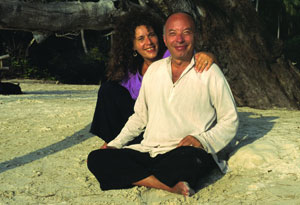Make Friends with Your Life: The Good, the Bad and the Ugly!

Photo: Tay Jnr/Photodisc/Thinkstock
Many people feel pain, loss and sorrow—but do you let it define who you are? Or avoid it like the plague so you don't have to deal with the real issue at hand? Instead of medicating your pain or wallowing in it, find out why it's actually normal to experience the hard times.
Everyone wants a good life; no one wants to suffer. How great it would be if things went just the way you want them to, but you know that doesn't happen. Has anyone lived a whole life without some measure of loss, grief, pain or hardship? These states are intrinsic with being human.There is a story of a woman who came to the Buddha in tears as her only son died. She begs him to bring her son back to life; the pain of his death is too much for her to bear. Finally, the Buddha agrees. He says he will bring the boy back to life, but only if the woman can get him a single mustard seed from a house where no one has ever died. The distraught woman rushes off and proceeds to go from door to door trying to find a home that has never experienced a death. Of course, she cannot find a single place.
The point here is that suffering is a normal part of being human. Life is also filled with beauty, joy, a mother holding her baby, daffodils in the spring, dew on a spider's web and the depth of intimate love. You hang out with happiness as much as you can, but getting to know suffering is not what you normally do.
Do you deny or indulge in your suffering?

Photo: Stockbyte/Thinkstock
Indeed, if you're honest, most of your time is spent either pushing suffering away so as to avoid it, whether through painkillers, entertainment, shopping, sensual pleasures or intoxicants—or, alternatively, holding onto suffering and using it as a means of distinction, a way of getting attention and sympathy. Do these two extremes sound familiar: push or pull, deny or indulge, pretend nothing is wrong or exaggerate the pain?
If you want to suffer, then why do you? We were teaching a workshop in England, and we asked the group: "What makes us hold onto pain and suffering?" To our surprise, everyone raised their hands! They agreed that they didn't want to suffer, yet they held onto suffering because it felt so familiar. Your habitual mind can lock you into patterns that are mentally unhealthy, such as holding onto grudges or past hurts, as they create a sense of identity.
The word suffering comes from the Pali word dukkha, which not only means suffering but includes all its varied family relations, such as discomfort, pain, anguish, dissatisfaction, failure, conflict, hurt. What do you do when one of these comes knocking at your door? How do you relate to it? Do you push it away, cover it up or seek distraction? Denying suffering is what society does all the time. Look at how advertisements focus on the young and beautiful; how people ignore the process of aging by putting the elderly in separate homes; how people insulate themselves from the weather, from too much cold or too much heat; how they separate the rich and the poor so their paths rarely cross.
The denial of suffering means your real feelings get repressed, held in and squashed down, which results in you getting cut off from all your other feelings as well, not just the uncomfortable ones. Life becomes more superficial and empty because any depth of real feeling has been put out of reach. Resistance to suffering means no vital life force flowing through you—who you really are is hidden away.
Or do you make your difficulties the centerpiece of your conversation, creating an image as one who suffers? Please don't feel guilty about this, because it is not unusual! In an overpopulated and competitive world, you seek ways to appear different and special in order to gain attention. Doing it through highlighting your suffering is no better or worse than doing it any other way. But it does mean suffering becomes imbued with importance—it becomes my suffering, my pain, my problem, and given the choice, I might not even want to give it up. Who would you be without something to complain about, something that generates such attention, without your identity?
How to understand your suffering
If you want to suffer, then why do you? We were teaching a workshop in England, and we asked the group: "What makes us hold onto pain and suffering?" To our surprise, everyone raised their hands! They agreed that they didn't want to suffer, yet they held onto suffering because it felt so familiar. Your habitual mind can lock you into patterns that are mentally unhealthy, such as holding onto grudges or past hurts, as they create a sense of identity.
The word suffering comes from the Pali word dukkha, which not only means suffering but includes all its varied family relations, such as discomfort, pain, anguish, dissatisfaction, failure, conflict, hurt. What do you do when one of these comes knocking at your door? How do you relate to it? Do you push it away, cover it up or seek distraction? Denying suffering is what society does all the time. Look at how advertisements focus on the young and beautiful; how people ignore the process of aging by putting the elderly in separate homes; how people insulate themselves from the weather, from too much cold or too much heat; how they separate the rich and the poor so their paths rarely cross.
The denial of suffering means your real feelings get repressed, held in and squashed down, which results in you getting cut off from all your other feelings as well, not just the uncomfortable ones. Life becomes more superficial and empty because any depth of real feeling has been put out of reach. Resistance to suffering means no vital life force flowing through you—who you really are is hidden away.
Or do you make your difficulties the centerpiece of your conversation, creating an image as one who suffers? Please don't feel guilty about this, because it is not unusual! In an overpopulated and competitive world, you seek ways to appear different and special in order to gain attention. Doing it through highlighting your suffering is no better or worse than doing it any other way. But it does mean suffering becomes imbued with importance—it becomes my suffering, my pain, my problem, and given the choice, I might not even want to give it up. Who would you be without something to complain about, something that generates such attention, without your identity?
How to understand your suffering

Photo: Courtesy of Ed and Deb Shapiro
In the same workshop in England, mentioned earlier, Mary admitted that the idea of being free of pain—and, therefore, having less involvement with doctors and therapists—meant she would get less nurturing. Chris said being happy meant he would have nothing special to focus on. Liz summed it up when she said, "I have the support of some very loving people to encourage, assist and love me. But if I am well, will I still have as much support? I often fear my husband might leave me if I were to get better."
Ideally you should neither push suffering away nor indulge in it, but simply understand suffering for what it is: an ever-changing, impermanent condition that arises as a result of other conditions. Life is constantly changing, moving, flowing. Because nothing stays the same, then at some time there will be pain and at other times there will be pleasure; pain is not an isolated or permanent state, just a part of a greater flow. When you allow suffering simply to be, then you can know it for what it is: not as my suffering or your suffering, not as something owned, but as an expression of circumstances. Pain need not dominate your life or fill your every waking moment. Suffering is suffering, grief is grief, discomfort is uncomfortable. They are a part of being alive.
You don't have to do anything about your suffering. You don't have to develop great skills in dealing with it or spend hours of diligent practice to eliminate it. You do not have to go anywhere to enjoy your breath, to appreciate the beauty in the trees and flowers. All you have to do is be present. Try the meditation below to be in the flow of what is.
Being with What Is
Find a comfortable seat with your back upright and your eyes closed. Settle your body and bring your focus to the natural flow of your breath as it enters and leaves your body. Just watch your breath as you become quiet and relaxed.
Now become aware of the world around you, and visualize the ground beneath you and the sky above, and all of nature in her many forms.
Become aware of the flow of nature, how it is always shifting and changing. One minute there is sunshine, another there is a storm; one minute there are leaves and flowers, another the branches are empty. The tides and the moon are constantly waxing and waning, here and then gone. As you focus on this eternal movement of life, let trust grow in your heart that all things are as they are meant to be.
If suffering arises, label it as suffering; do not identify with it as your suffering. If joy arises, label it as joy. Let life live through you.
When you are ready, take a deep breath, and gently open your eyes. And smile!
Ed and Deb Shapiro are the authors of Be The Change, How Meditation Can Transform You and the World. They are featured weekly contributors to Oprah.com, HuffingtonPost.com and Care2.com. Ed and Deb write Sprint's The Daily CHILLOUT inspirational text messages. They have three meditation CDs: Metta: Loving Kindness and Forgiveness, Samadhi: Breath Awareness and Insight and Yoga Nidra: Inner Conscious Relaxation. Deb is also the author of the best-selling book Your Body Speaks Your Mind, winner of the 2007 Visionary Book Award.
Keep Reading More from Ed and Deb Shapiro:
Listen to your heart, not your head
Transform your fear into courage
The beauty of living in the moment
Ideally you should neither push suffering away nor indulge in it, but simply understand suffering for what it is: an ever-changing, impermanent condition that arises as a result of other conditions. Life is constantly changing, moving, flowing. Because nothing stays the same, then at some time there will be pain and at other times there will be pleasure; pain is not an isolated or permanent state, just a part of a greater flow. When you allow suffering simply to be, then you can know it for what it is: not as my suffering or your suffering, not as something owned, but as an expression of circumstances. Pain need not dominate your life or fill your every waking moment. Suffering is suffering, grief is grief, discomfort is uncomfortable. They are a part of being alive.
You don't have to do anything about your suffering. You don't have to develop great skills in dealing with it or spend hours of diligent practice to eliminate it. You do not have to go anywhere to enjoy your breath, to appreciate the beauty in the trees and flowers. All you have to do is be present. Try the meditation below to be in the flow of what is.
Being with What Is
Find a comfortable seat with your back upright and your eyes closed. Settle your body and bring your focus to the natural flow of your breath as it enters and leaves your body. Just watch your breath as you become quiet and relaxed.
Now become aware of the world around you, and visualize the ground beneath you and the sky above, and all of nature in her many forms.
Become aware of the flow of nature, how it is always shifting and changing. One minute there is sunshine, another there is a storm; one minute there are leaves and flowers, another the branches are empty. The tides and the moon are constantly waxing and waning, here and then gone. As you focus on this eternal movement of life, let trust grow in your heart that all things are as they are meant to be.
If suffering arises, label it as suffering; do not identify with it as your suffering. If joy arises, label it as joy. Let life live through you.
When you are ready, take a deep breath, and gently open your eyes. And smile!
Ed and Deb Shapiro are the authors of Be The Change, How Meditation Can Transform You and the World. They are featured weekly contributors to Oprah.com, HuffingtonPost.com and Care2.com. Ed and Deb write Sprint's The Daily CHILLOUT inspirational text messages. They have three meditation CDs: Metta: Loving Kindness and Forgiveness, Samadhi: Breath Awareness and Insight and Yoga Nidra: Inner Conscious Relaxation. Deb is also the author of the best-selling book Your Body Speaks Your Mind, winner of the 2007 Visionary Book Award.
Keep Reading More from Ed and Deb Shapiro:
Listen to your heart, not your head
Transform your fear into courage
The beauty of living in the moment



